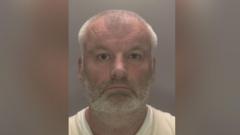
As a hidden radio came to life in the attic of a German concentration camp, a voice almost too impossible to believe began to speak.
It was Winston Churchill announcing the end of war in Europe – the famous words which Beatrix Frank became the first person in the notorious Theresienstadt camp to hear.
The English woman quickly spread the news of Germany’s surrender eighty years ago today, but her fellow inmates didn’t feel hope or optimism, but rather fear and dread.
This revelation kicked off one family’s unbelievable journey to the UK, where another Holocaust survivor was celebrating freedom of his own, after a remarkable escape from Nazi Germany six years earlier.

Beatrix’s son, Steven Frank, just nine at the time, was on death’s door on VE Day, as he was starving and fighting an infestation of worms in his gut.
The now 89-year-old told Metro: ‘We were still under German occupation and people were terrified of what the Germans were going to do before the war ended that night.
‘We thought they were going to get rid of as many Jews as they could before midnight.’
Steven, his mum, and his brothers Nick and Carrel had been living in the Theresienstadt ghetto and transit camp since September 1944.
While Beatrix was from England, the Dutch Jewish family had been living in Amsterdam, where Steven’s father was in the resistance.
But when his dad was betrayed and sent to Auschwitz, the remaining trio ended up in a string of camps before arriving at Theresienstadt.

The camp, in Czechoslovakia, was partly a ‘holding pen’ for Jewish people before they were taken to death camps, and a ghetto designed to kill as many inmates as possible.
‘People were dying all over the place. Starvation was rampant. There was little food about,’ Steven said.
It was because Beatrix was able to claim extra rations by working in the camp’s hospital laundry that she and her three boys were able to stay alive.
It meant they were well enough to notice that the end of the war was fast approaching.
‘The turning point was when the planes going overhead did not have black crosses on their wings.
‘They were white stars, which were American planes, not German.
‘We began to realize that something was changing.’

It was on VE Day in 1945, when Steven’s mum, Beatrix, got to hear the news that the thousands of prisoners had been waiting for.
She was approached by Russian prisoners of war in the camp and taken to a radio they had hidden in their attic.
Steven explained: ‘They knew something important was going to be broadcast, but it was going to be in English.
‘So they asked my mother if she would listen to it, and they took her up in the attic, and they gave her a piece of paper with a pencil.
‘So my mother listened, and it was Winston Churchill broadcasting over the overseas service of the BBC from the Cabinet War Rooms.
‘My mother was probably the very first person in the camp to realise that at midnight, the war would be over.’
Steven, who was in a children’s home in the camp, soon learned the news of Germany’s surrender, but also heard rumours that Germany was about to destroy the camp before they stopped fighting for good.
Sorry, this video isn't available yet.

He added: ‘The Germans absolutely hated us. They were building the gas chambers in Theresienstadt.
‘There had even been a rumour that they dynamited the camp.
‘It felt touch and go whether the war was going to end before we were going to die.’
But when the camp woke up on May 9, the Soviet Red Army were at the gates of the camp and liberated Theresienstadt.
‘There was a sigh of relief that the threat of death, the threat of deportation, the threat of being gassed was now over.
‘But then somehow or other we had to try and keep living. People were quietly happy but determined to try to keep alive.’

In the months that followed, the Franks embarked on a remarkable journey through Europe to get to London, where Beatrix’s family lived.
She begged the Red Cross not to take them back to Holland, where she feared all of her family were dead.
They then talked their way onto a British plane at the Czech city of Pilsen, and again managed to get a flight to London from Paris.
It was there, after driving through the Blitz-destroyed London, that Beatrix reunited with her father and began a new life with her children in England.
Steven said: ‘It was an extraordinary journey and tremendous ingenuity and determination by my mum.
‘VE day of course has always been very important to me because it’s about veterans. If it wasn’t for them we wouldn’t be here today.’
Just six years earlier, Gerald Granston left a German port heading to Cuba, but in a life-saving twist ,ended up in England.

The SS St Louis was the ship, soon to be infamous, of Jewish refugees that nobody wanted.
By the time it departed Hamburg on May 13 1939, passengers Gerald and his father had survived devastating Nazi persecution in their home town in Eastern Germany.
Their synagogue had been destroyed during Kristallnacht, the destructive night of attacks against Jewish people in 1938
Gerald, who was six at the time he boarded the St Louis, told Metro: ‘Kristallnacht was a catalyst. The synagogue was totally trashed. It was obvious, even as a six-year-old, that it was state prejudice.’
‘I was told that when I walked past a policeman, I had to walk in the gutter and not look at him.’
It is no surprise, then, that the mood inside the SS St Louis was jubilant as Gerald, his father and 900 other Jewish refugees sailed away from Germany to Cuba.

‘Even at six I could see my father smiling again,’ Gerald said.
‘The ship was magnificent. I had never had life like it for two weeks.
‘The sailors would tell us: “When you get to Cuba, you’ll love it”.’
Cuba was seen as a transit point to get to America, the promise of safety that all Jewish refugees had paid thousands to try to reach.
But as the ship pulled up outside the Caribbean Island, one catastrophic problem emerged – Cuba did not want them.
Officials refused to let the refugees off the ship, despite a week of haggling, and US officials in Florida did the same days later.
So the ship had no option but to turn back and head to Europe.

Gerald remembered the horror on board: ‘Everything changed on the way back.
‘Even I knew that wasn’t good. I saw people crying their eyes out, saying “we are going back to Germany”.’
In the end, the ship’s passengers did not have to go back to Nazi Germany, as Belgium, France, Holland and the UK agreed to take the refugees.
Gerald and his dad arrived in London in June 1939 as two of the 288 passengers taken by the UK.
They were the lucky ones – 250 of the other passengers still died at the hands of the Nazi’s as Hitler’s war machine conquered the whole of Europe in the years to come.
Hardship was not over for them either, as Gerald was twice evacuated to avoid the horrors of the Blitz in London.
But he was back in the capital to experience one of London’s most memorable moments – the rapturous celebrations for VE Day 1945.

Gerald added: ‘I went along with a family friend. We walked got on the underground from West Hampstead and travelled to Baker Street.
‘We wanted to go to the Mall, but people were going mad.
‘I remember trying to climb up a pedestrian crossing. Their lights were flashing on and off.
‘It was a feeling I’d never felt again. The Germans were beaten.’
As Gerald was jubilant on that day, he was all but unaware of the scale of the horrors faced by other Jewish people who were trapped in Europe.
Six million Jewish people, as well as another five million who weren’t, were killed at concentration camps, in ghettos or at the hands of German officers during the Holocaust.
Both Steven and Gerald have made it their life’s mission to educate others, in particular children, about Nazi’s Germany persecutions of Jewish people and other minorities through their own stories.
The pair have both been awarded British Empire Medals for these efforts.
Steven, who has given close to 1000 talks in schools, told Metro: ‘It’s my thank you to this country for having allowed me to come here, to live here, and brought up here, and to love here, and to bring my family up in this country.’
Get in touch with our news team by emailing us at [email protected].
For more stories like this, check our news page.







.jpg.webp?itok=1zl_MpKg)





 Bengali (Bangladesh) ·
Bengali (Bangladesh) ·  English (United States) ·
English (United States) ·